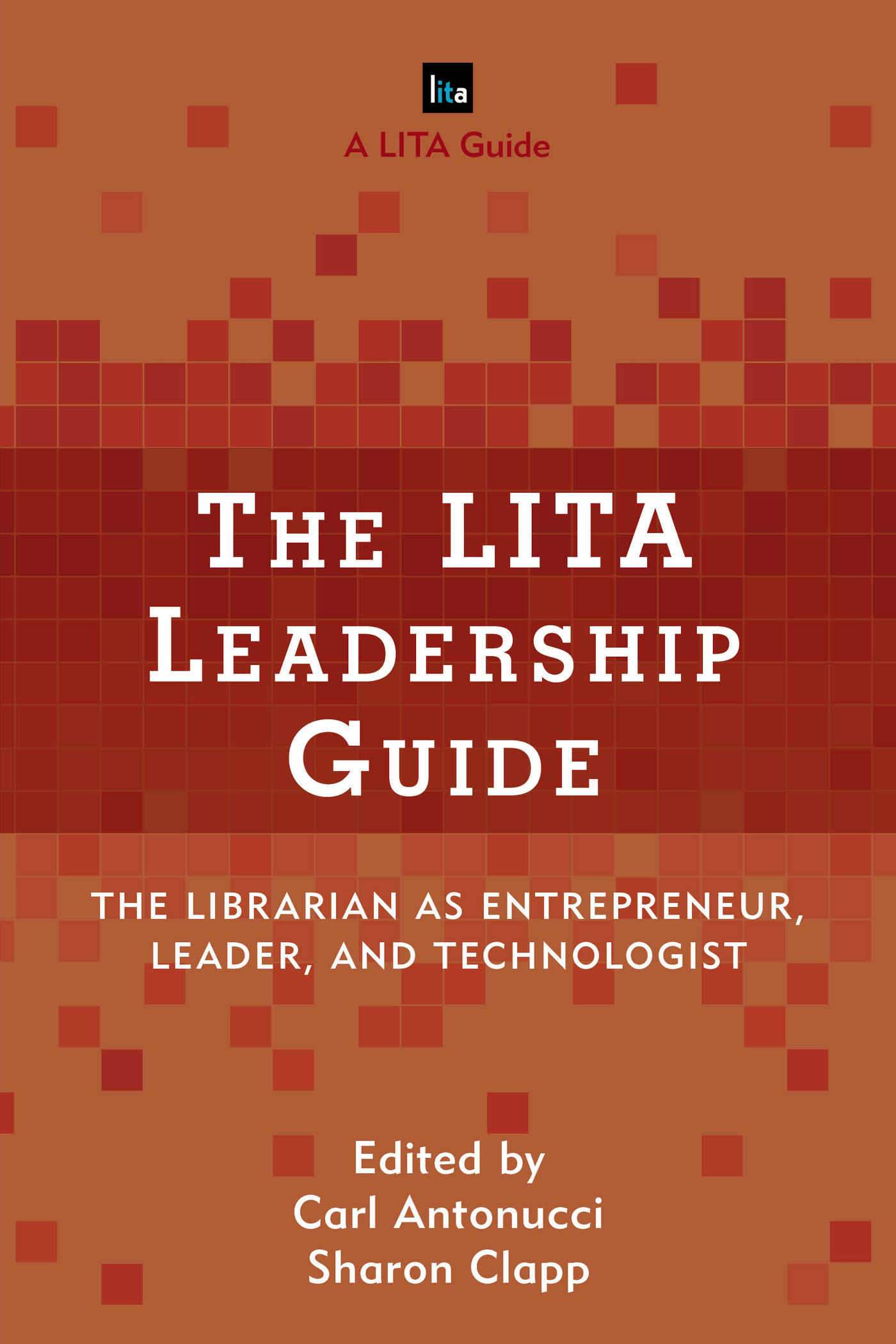The LITA Leadership Guide
LIBRARY INFORMATION TECHNOLOGY
ASSOCIATION (LITA) GUIDES
Marta Mestrovic Deyrup, Ph.D.
Acquisitions Editor, Library Information and Technology Association,
a division of the American Library Association
The Library Information Technology Association (LITA) Guides provide information and guidance on topics related to cutting-edge technology for library and IT specialists.
Written by top professionals in the field of technology, the guides are sought after by librarians wishing to learn a new skill or to become current in todays best practices.
Each book in the series has been overseen editorially since conception by LITA and reviewed by LITA members with special expertise in the specialty area of the book.
Established in 1966, the Library and Information Technology Association (LITA) is the division of the American Library Association (ALA) that provides its members and the library and information science community as a whole with a forum for discussion, an environment for learning, and a program for actions on the design, development, and implementation of automated and technological systems in the library and information science field.
Approximately 25 LITA Guides were published by Neal-Schuman and ALA between 2007 and 2015. Rowman & Littlefield took over publication of the series beginning in late 2015. Books in the series published by Rowman & Littlefield are:
Digitizing Flat Media: Principles and Practices
The Librarians Introduction to Programming Languages
Library Service Design: A LITA Guide to Holistic Assessment, Insight, and Improvement
Data Visualization: A Guide to Visual Storytelling for Librarians
Mobile Technologies in Libraries: A LITA Guide
Innovative LibGuides Applications
Integrating LibGuides into Websites
Protecting Patron Privacy: A LITA Guide
The LITA Leadership Guide: The Librarian as Entrepreneur, Leader, and Technologist
The LITA Leadership Guide
The Librarian as Entrepreneur, Leader, and Technologist
Edited by
Carl Antonucci
Sharon Clapp
Foreword by Maureen Sullivan
ROWMAN & LITTLEFIELD
Lanham Boulder New York London
Published by Rowman & Littlefield
A wholly owned subsidiary of The Rowman & Littlefield Publishing Group, Inc.
4501 Forbes Boulevard, Suite 200, Lanham, Maryland 20706
www.rowman.com
Unit A, Whitacre Mews, 26-34 Stannary Street, London SE11 4AB
Copyright 2017 by American Library Association
All rights reserved. No part of this book may be reproduced in any form or by any electronic or mechanical means, including information storage and retrieval systems, without written permission from the publisher, except by a reviewer who may quote passages in a review.
British Library Cataloguing in Publication Information Available
Library of Congress Cataloging-in-Publication Data Available
ISBN 9781442279018 (hardback : alk. paper) | ISBN 9781442279025 (pbk. : alk. paper) | ISBN 9781442279032 (electronic)
 TM The paper used in this publication meets the minimum requirements of American National Standard for Information Sciences Permanence of Paper for Printed Library Materials, ANSI/NISO Z39.48-1992.
TM The paper used in this publication meets the minimum requirements of American National Standard for Information Sciences Permanence of Paper for Printed Library Materials, ANSI/NISO Z39.48-1992.
Printed in the United States of America
For my wife, Luisa, and my children, Natalie, Antonio, and David.
Carl Antonucci
With gratitude to my dear husband, Chris Michaud, who has been my strength in all of our years together.
Sharon Clapp
Foreword
Maureen Sullivan
Librarians have long recognized the need to pursue innovation to ensure that the programs and services offered to students, faculty, and scholars meet their ever-changing needs and expectations. The evolving digital world brings new challenges and calls for every librarian to develop as a leader, entrepreneur, and technologist. The confluence of these three areas of practice demands a renewed commitment to professional development and a disciplined approach to learning a set of new competencies. The professional practice of librarians is becoming more complex. It brings challenges and also opportunities. To embrace and carry out the three roles of entrepreneur, leader, and technologist requires a clear and deep understanding of the knowledge, skills, and abilities that are essential to effective practice. The future of academic and research libraries and that of our profession depends upon this commitment.
The librarian as entrepreneur is a role rich with opportunities to make a difference in higher education and to make a significant contribution to student learning, faculty teaching, research, and scholarship. The entrepreneur recognizes that creativity is a capacity in all of us and takes steps to nurture this in self and others. This leads to innovation in practice when collaboration and experimentation become a way of life in professional practice. The librarian as entrepreneur embraces opportunities to rethink current practice, to create new programs and services, to rethink and redesign.
The librarian as leader is an essential role, both inside the library organization and in the larger external environment. Every librarian needs to be a leader whether by the formal requirements of her or his position in the library or through more informal situations where leadership is undertaken because opportunities present themselves. Both formal and informal leaders must have the capacity to engage, inspire, and motivate those with whom they work. They need to have strong interpersonal skills, especially the ability to communicate and manage relationships with a variety of diverse individuals. Leaders need to have emotional intelligence; be willing to take risks and pursue new initiatives and areas of work; deal with different constituencies and manage their different expectations; articulate a compelling vision while engaging others to work together to create a shared vision; and foster a work environment in which diversity, inclusion, collaboration, future-focus, and high performance define the organizational culture.
The librarian as technologist role is one that challenges some, especially those who are beyond midcareer. This role is as important and critical to successful organizational performance as the other two. The time has come for every librarian to have a general knowledge of the key technology systems and applications in libraries and to possess the core skills of the technologist. As we move further and deeper into the digital world every competent professional must be committed to keeping up with the key trends and developments in this area. This may be a challenging area for individual professional development, but it also is an area that is essential for personal mastery in our field.
The successful integration of these three roles throughout the field will enable the collaboration and commitment necessary to rethink and redesign our work, our organizational structures, facility and space design, service models, and what it will mean to be a librarian in the academy of the future. The contributions of librarians to higher education often go unnoticed and underappreciated. It is time to step forward and embrace the roles of entrepreneur, leader, and technologist and to do so in collaboration with colleagues in our libraries and across the field.

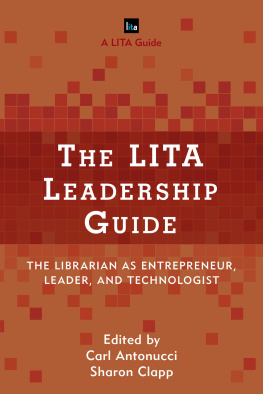

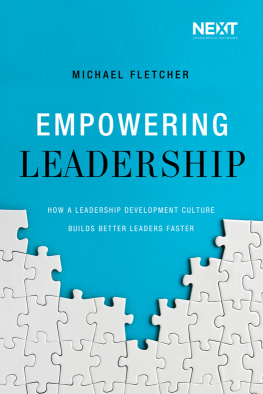
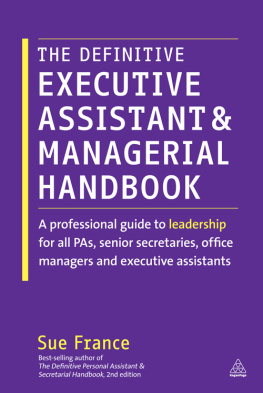
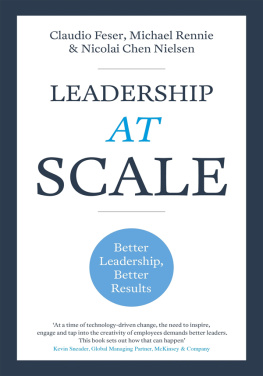
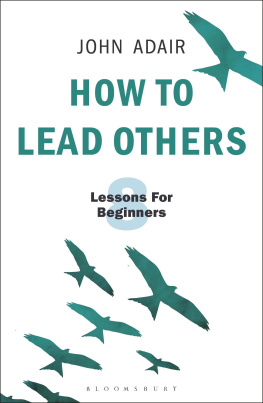
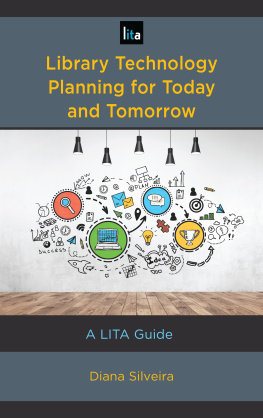
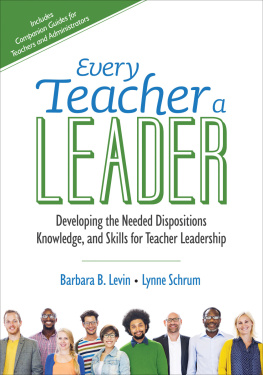
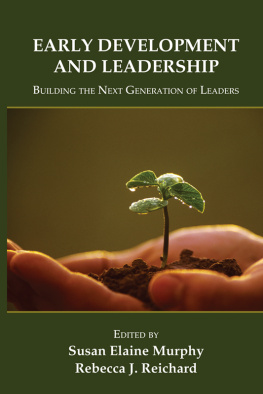
 TM The paper used in this publication meets the minimum requirements of American National Standard for Information Sciences Permanence of Paper for Printed Library Materials, ANSI/NISO Z39.48-1992.
TM The paper used in this publication meets the minimum requirements of American National Standard for Information Sciences Permanence of Paper for Printed Library Materials, ANSI/NISO Z39.48-1992.